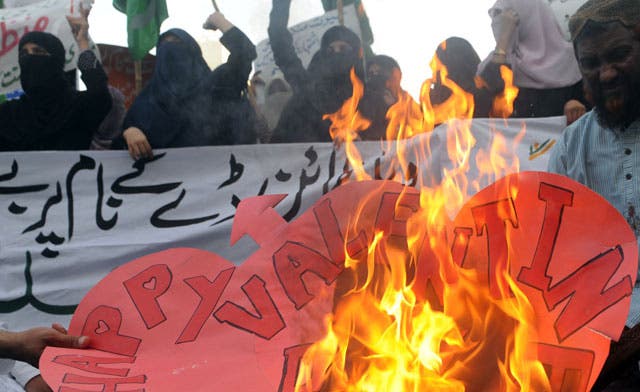Some Muslims embrace Valentine’s Day, others call to boycott it
As many around the world prepared to celebrate Valentine’s Day on Thursday, some Muslims in a number of countries voiced their opposition to the day and denounced it as un-Islamic.
During the week, Some Pakistanis celebrated Valentine’s Day with balloons and flowers, but others denounced the holiday as an insult to Islam.
In the port city of Karachi, home to 18 million people, billboards decorated with a black heart urged citizens to “SAY NO TO VALENTINE'S DAY,” Reuters reported.
“This tradition reflects insensitivity, indignity and ignorance of Islam,” the signs read. They were put up by a group affiliated with Jamaat-e-Islami, a religious political party that holds six of 342 legislative seats told Reuters.
“Teenagers see it as a time to express love and affection and they often end up in sex parties, like in the West.”
According to Syed Askari, a spokesman for Jamaat-e-Islami, “Valentine’s is against Islamic culture. In our view, relationships are sacred. We have arranged marriages in this culture and people don’t get married for love.”
“This is imposing Western values and cultures on an Islamic society,” he added.
The spokesman derided the West, warning that Muslim countries shouldn’t turn like them.
“Look at the West - people love their dogs but throw their parents out when they get old. We don't want to be like that.”
Meanwhile, in the northwestern city of Peshawar, a handful of people burnt Valentine’s Day cards in front of television cameras on Monday. Women wearing black robes held signs denouncing the tradition.
In the same vain, Islamic conservatives in Indonesia, the world’s biggest Muslim-populated nation, called for opposing Valentine celebrations saying it promotes teen “sex parties” and premarital sex.
The deputy mayor in the conservative city of Depok on Jakarta’s outskirts urged parents to stop their children from celebrating, local religious leaders voiced support, reported AFP.
The Head of the hardline Islamic Defenders Front (FPI) in Depok, Habib Idrus Al Gadhri, declared the day “haram” (forbidden) for Muslims, claiming it is part of the culture of “infidels.”
“It’s Western culture and immoral so it's ironic Muslims celebrate it,” he said.
Despite the calls, many of the Indonesia’s glitzy malls, hotels and restaurants are offering love-themed banquets and special events.
Around 90 percent of Indonesia’s 240 million people are Muslim but the vast majority practices a moderate form of the religion.
‘Headscarf day’
Dozens of schoolgirls wearing headscarves in Indonesia’s eastern Java’s Malang city protested against Valentine’s Day, declaring Feb. 14 “headscarf day.”
With plans to protest in several cities, the girls have distributed pamphlets illustrating how men and women should dress modestly, covered from head to toe.
Local media reported protests in the central Java city of Solo on Wednesday, where nearly 500 elementary school students and teachers marched against youths celebrating the day. They carried signs reading “Valentine, Infidel Culture.”
‘Good for business’
Businessmen in some Islamic countries insisted on preparing for Valentine’s Day to flourish their businesses.
In Iran, youth abandoned thoughts of sanctions, nuclear power and economic hardship in favor of shopping for gifts and making dinner plans to celebrate love on Valentine’s Day, according to Reuters.
Despite rising tensions with the West over its nuclear ambitions, many Tehran restaurants were fully booked and young Iranians could be seen out browsing gift shops in the capital to buy presents for loved ones in defiance of a ban on Valentine’s Day items aimed at preventing the spread of “Western culture.”
Last year, Iranian authorities banned the sale of Valentine cards and other heart-shaped products and police have warned that action will be taken against those who violate the ban, reported the agency.
“This year they told us not to sell any red roses otherwise we can face the closure of our flower shop,” a 40-year-old female florist in north Tehran told Reuters.
In Pakistan’s capital of Islamabad, hawkers selling heart-shaped balloons staked out street corners and florists were doing a brisk trade.
“Valentine’s Day is good for business,” said grinning Mohammed Ajmar to Reuters as he handed a customer a huge heart made of red roses and glitter.
